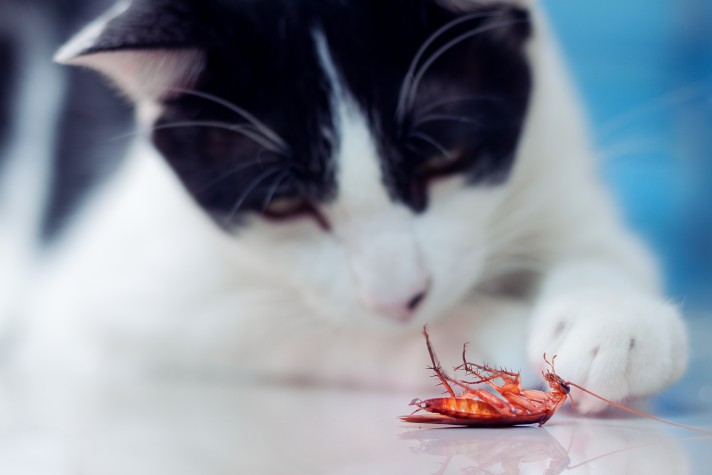
Connect with a verified veterinarian in minutes. Licensed vets are available 24/7 to answer your questions. No need to worry about your furry family member.
Most people are familiar with cockroaches. They scurry around in infested buildings, coming out at night and then disappearing during the day. While we view these insects as pests, cats may see cockroaches as something fun to play with, or even eat!
Why Do Cats Eat Cockroaches?
Cats are carnivores and they still carry the instincts inherited from their wild ancestors. Hunting was a way to survive. While most cats that live in a comfortable home don’t have to hunt to stay alive, they still carry the instinct to hunt and kill.
Many cats enjoy playing with all types of insects including cockroaches. Think of it from a cat’s perspective. They see something small and fast running across the floor. Why not have fun with it?
Are Cockroaches Bad for Cats to Eat?
Cockroaches by themselves are not toxic to cats. So, if your fur baby happens to catch and eat one once in a while, chances are he will be OK.
However, some cats may have trouble with the bug’s exoskeleton. This is a piece of hard shell that keeps the insects safe. You could think of this as similar to armor. The shell, when crushed, can break into small, sharp pieces. These can then either cause a choking hazard or cause trouble in the cat’s digestive system.
The cockroach’s shell can also pose another major health issue. It’s entirely possible a large piece of the shell could become lodged in the cat’s intestine, causing a bowel obstruction. In that case, you may notice these symptoms:
- Lethargy
- Hiding
- Not able to keep water or food down
- Weight loss
- Painful abdomen, possibly with swelling
- Not comfortable when lying down
If you notice these symptoms, be sure to call the vet immediately. This could be a life-threatening medical emergency. If you think your cat has eaten cockroaches, it is recommended to call your veterinary clinic for individual advice for your pet.
Another problem with cockroaches is that they may have been exposed to pesticides. You may notice these symptoms if your cat’s eaten a poisoned cockroach:
- Vomiting
- Diarrhea
- Difficulty walking
- Dizziness
- Lethargy
- Difficulty breathing
If you notice these symptoms, then it’s time to call the vet immediately. This may be a medical emergency. It is important to remember that these symptoms are not always seen straight away after your cat has eaten an infected cockroach. Therefore, if you have any suspicion that your cat may have eaten a poisoned cockroach, phone your veterinary clinic for individual advice.
Cats may also catch parasites from eating roaches, such as Physaloptera worms. If your kitty eats an infected cockroach, you may notice these symptoms:
- Vomiting
- Diarrhea
- Parasite eggs in your cat’s poop
If you notice these symptoms, it’s best to call the vet and make an appointment for your fur baby. Vets can diagnose worms by checking your cat’s feces.
Cockroaches can also carry harmful bacteria, including salmonella, staphylococcus, and streptococcus. These can cause infections in your fur baby.

Review symptoms, medications & behavior to keep your pets healthy with a Vet Online in just minutes.
Ask a Vet Live NowHow to Get Rid of Cockroaches?
Cockroaches can be very challenging to get rid of, especially if there’s an infestation. It’s best to call a professional exterminator to get rid of these pests. They know how to kill cockroaches and other pets without making you, your family, or your pets sick.
You may also want to check your pipes in the kitchen. Leaky pipes can attract roaches, so sealing these pipes and exterior holes can keep roaches out.
In addition, it may help to invest in waste baskets with lids and store food in airtight containers. Clean up all spills and crumbs, or these may attract roaches and other pests. And avoid leaving food out, as this can also attract pests.
Can I Use Bait Traps and Sprays?
It’s best to avoid these kinds of pest control options. These can be toxic to cats and other pets.
How Common are Cockroaches?
They’re very common! There are over 4,600 species of cockroaches; however, most of these live in the wild, except for about 30 species that are drawn to where humans live.
The most common roaches in North America include:
- American cockroaches
- German cockroaches
- Oriental cockroaches
- Brown-banded cockroaches
Roaches live on every continent except Antarctica! These insects are highly adaptable. They can even survive 6 to 15 times more radiation exposure than humans! And they eat almost anything, including food, leather, paper, glue, skin flakes, and hair.
For the most part, eating a cockroach once in a while shouldn’t cause a problem for your cat. But the sooner your pet receives individual veterinary advice for eating cockroaches, the better chance they have of making a full recovery.
Connect with a verified veterinarian in minutes. Licensed vets are available 24/7 to answer your questions. No need to worry about your furry family member.

Evie Moloney, RCVS
This article has been reviewed and approved by an independent Veterinarian: Evie is a vet surgeon who graduated from the University College Dublin, which is the only university offering the veterinary medicine degree in Ireland. She really enjoys surgery and has also worked as an emergency and critical care vet. She is passionate about sharing education about preventative health care for pets, especially the importance of regular dog and cat teeth brushing at home. She also enjoys helping owners find practical solutions for keeping pets as comfortable as possible while living with conditions such as arthritis. When not working, she enjoys hiking and swimming.
Review symptoms, medications & behavior to keep your pets healthy with a Vet Online in just minutes.
Ask a Vet Live Now




